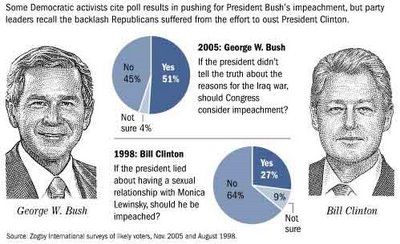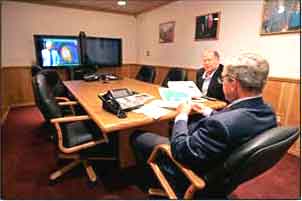
Events have recently conspired to depress my glee in posting these offerings, so here are the sweepings I recently found in my Blog fodder folder...
Interesting dicussion of
Festus's policy on tortureMark Danner: When you look at the record, the phrase I come back to, not only about interrogation but the many other steps that constitute the Bush state of exception, state of emergency, since 9/11 is "take the gloves off." We hear this again and again. The interesting thing about that phrase is the implication that before we had the gloves on, that the laws and principles that constitute our belief not only in democracy but in human rights left the country vulnerable. The U.S. adherence to the Geneva Convention, the U.S. record of treating prisoners humanely that goes back to George Washington, laws like the FISA law passed to restrict the government's power to surveil its citizens -- all of these constitute the gloves on American power and 9/11 signaled to those in power that the system with "the gloves on" was insufficient to protect Americans. That seems to be their belief.
As you know, very shortly after 9/11, the then-White House counsel [Alberto Gonzales] proposed to President Bush that provisions of the Geneva Conventions had been rendered obsolete, even quaint, by this quote "new paradigm." The Geneva Conventions, the Convention against Torture, and the federal statutes against torture -- these undertakings by the U.S. -- represented restrictions that would unduly hobble the country in fighting the war on terror and, by extension, threaten[ed] the existence of the United States.
As if we needed more, another report on how Festus
had no plan for Post-Mission Completed Iraq The report is from the governments own investigator, not the liberal media or think-tank, named
Stuart W. Bowen Jr "There was insufficient systematic planning for human capital management in Iraq before and during the U.S.-directed stabilization and reconstruction operations," said Stuart W. Bowen Jr., the special inspector general for Iraq reconstruction, in a new "lessons learned" report released yesterday. "The practical limitations ensuing from this shortfall adversely affected reconstruction in post-war Iraq."
The Pentagon's initial plans for reconstruction crumbled when it encountered an unexpected foreign and domestic insurgency that looted the country, sabotaged electric and water service, and killed hundreds of Americans and Iraqis in 2003 after the ouster of dictator Saddam Hussein.
Mr. Bowen concluded in a report focusing on the CPA's staffing, "[t]he unanticipated post-war collapse of virtually all Iraqi governing structures, substantially hindered coalition efforts to develop and rapidly execute an effective reconstruction program."
The report was the latest in a series of audits and updates from Mr. Bowen to document how the Bush administration oversaw more than $30 billion in Iraq cash -- the Development Fund for Iraq (DFI) -- and about $24 billion in U.S. taxpayer money for reconstruction.
Mr. Bowen's investigators found significant fraud in the disbursement of millions of DFI dollars that the CPA failed to safeguard. The new Iraqi government controls the fund and says that as much as $1 billion alone was stolen by Iraqis inside the Defense Ministry. Mr. Bowen has not found significant fraud in the administering of the U.S. funds, he has said.
Finally a US Senator proposes
a baby step to kinda admonish the Festus White House about breaking the law and violating his oath of office, no offense. . . you know, bygones and nobody cares.
Sen. Russell Feingold's call this week to formally censure Bush for what some say was a clear violation of a federal statute regulating domestic surveillance has touched off a fierce debate on Capitol Hill that is likely to persist throughout the congressional campaign season.
GOP leaders who had been reeling from the impact of Republican political scandals, an unpopular war and Bush's mishandling of the port-security issue sensed that Feingold overplayed his hand and denounced the censure resolution as a political stunt by an ambitious lawmaker positioning himself to run for president in 2008. Many Democrats, while sympathetic to Feingold's maneuver, appeared to be distancing themselves from his resolution yesterday, wary of polls showing that a majority of Americans side with the president on wiretapping tactics.
Finally the
EPA get's slapped down by the DC Court of Appeals for trying to redefine the english language.
THE MEANING OF "ANY"....As part of a process called New Source Review, the Clean Air Act requires power plant operators to install specific types of pollution control equipment whenever they make "any physical change" that increases the amount of air pollution a plant emits. As you can imagine, the power industry dislikes this requirement, and if they dislike it then so does the Bush administration.
So a couple of years ago, after failing to get Congress to change the law, the EPA issued a rule declaring that "any" actually means "things that cost more than 20% of the value of the plant." So if you run a $1 billion plant, you can make $200 million worth of pollution increasing modifications without running afoul of the Clean Air Act.
Today, after listening to the EPA's pretzel-bending defense of its postmodern definition of "any," the DC Court of Appeals told the Bush administration to stuff a sock in it:
In this context, there is no reason the usual tools of statutory construction should not apply and hence no reason why “any” should not mean “any.”
I think this is where I came in. The Festus White House is using
the same tactics to scare us into demonizing Iran as they did Iraq
U.S. intelligence officials, already focused on Iran's potential for building nuclear weapons, are struggling to solve a more immediate mystery: the murky relationship between the new Tehran leadership and the contingent of Al Qaeda leaders residing in the country.
Some officials, citing evidence from highly classified satellite feeds and electronic eavesdropping, believe the Iranian regime is playing host to much of Al Qaeda's remaining brain trust and allowing the senior operatives freedom to communicate and help plan the terrorist network's operations.
And they suggest that new President Mahmoud Ahmadinejad may be forging an alliance with Al Qaeda operatives as a way to expand Iran's influence or, at a minimum, that he is looking the other way as Al Qaeda leaders in his country collaborate with their counterparts elsewhere.
A very concise explaination on how
power corrupts realityIt's not that we were lacking information. It's that, when that information came out, it was denied and those in power were able to impose their view of reality. Political power decided what reality was, despite clear information to the contrary. When I look at our time I see that phenomenon writ large. It's gone way beyond a massacre in a relatively obscure Central American country. It's gone to policies and statements that led the United States to invade a country that had not attacked us, to torture prisoners and deny we're doing it even when clear evidence says that we are, to domestic spying in which the government is clearly breaking the law and the President declares that he will continue to do so. In all these cases, it's not the information, it's the politics.
The "PayGo" Rules that Congress let lapse once the Republicans got in charge were crucial in balancing the budget when Clinton was in office. No reasonable excuse exists to not having them in place.
Senate Republicans on Tuesday narrowly defeated an effort to impose budget rules that would make it harder to increase spending or cut taxes, a move that critics said that showed Republicans were posturing in their calls for greater fiscal restraint.
Several politically charged budget and spending issues confronted Congress this week. Chairman of the Senate Budget Committee, Senator Judd Gregg, back to camera, talked to reporters on Capitol Hill on Tuesday.
In the first of several politically charged budget and spending issues confronting Congress this week, the Senate rejected on a 50-to-50 tie a proposal to restore what are known as "pay-go" rules, a requirement that tax cuts and some new spending be approved by 60 votes or offset by budget savings or revenue increases.
The book on
Whitewater has finally been closed.
Almost exactly a decade after Whitewater commenced with a confusing article in the New York Times, the great pseudo-scandal finally concluded last Wednesday with the release of a mind-boggling, five-volume report from the Office of Independent Counsel. Ten years of investigative mania, partisan malice and misplaced ambition haven't improved the story, but merely inflated a footnote into an epic.
To read the contents of the 2,200-page document produced by the OIC -- at $73 million, or more than $33,000 per page, probably the costliest publication in human history -- is to marvel at how stubbornly these prosecutors evaded the obligation to admit that their primary targets, Bill and Hillary Clinton, were innocent. Even now they cannot confront that damning verdict without resorting repeatedly to the weasel phrase that has become their fraternal motto: "insufficient available evidence to establish beyond a reasonable doubt."
It is likely by now that most Americans have forgotten what, exactly, Kenneth Starr and his persistent assistants were attempting to prove. The Whitewater allegations were vague and constantly shifting, as each headlined accusation quietly evaporated. The few clear and pertinent questions about the defunct development deal were answered with finality at least seven years ago.
An
update of the regal and glacial pace of the second part of the Senate Intelligence Committee on Festus's abuse of intelligence that led to the Iraq War. Don't hold your breath.
The Senate Intelligence Committee has moved toward completing its long-awaited investigation of the Bush administration's prewar assertions about Iraq, with three of five sections nearly finished, the committee's chairman said Tuesday.
Seeking to quell controversy over the pace of the inquiry, Sen. Pat Roberts (R-Kan.) for the first time provided details and a partial timeline for completing the investigation, which has been underway for more than two years.
He acknowledged that drafts of the two most controversial sections were the ones that were not finished, and he provided no time frame for completing them.
Peak Oil. This is an interesting introduction to why a lot of people think that we're on the downslope of oil production.
While no one piece of evidence is conclusive, I find the overall picture here to be suggestive that oil production is close to it's peak value and is not likely to increase too much more. Whether May 2005 will stand as the highest ever month of production or some month in 2006 or even 2007 rises a little higher is certainly hard to call. However, I would be quite surprised if the world is able to bring enough new production on stream to overcome those high decline rates in existing production for much longer. And with each passing year, it's only going to get harder to do.
The Death of M3. Somebody doesn't what us to know how much inflation we have ahead of us.
I see that the real culprit is the increase in the money supply and the distortion of interest rates causing malinvestment, overinvestment, overcapacities and excessive debt. If you don't have the information to indicate that there's something going wrong with the money supply, then we're less likely to blame the Fed for the problem.
An interesting
essay on Fascism. Hey I'm not pointing fingers or anything here, nope, not me. . .
The American fascists are most easily recognized by their deliberate perversion of truth and fact. Their newspapers and propaganda carefully cultivate every fissure of disunity, every crack in the common front against fascism. They use every opportunity to impugn democracy. They use isolationism as a slogan to conceal their own selfish imperialism. They cultivate hate and distrust of both Britain and Russia. They claim to be super-patriots, but they would destroy every liberty guaranteed by the Constitution. They demand free enterprise, but are the spokesmen for monopoly and vested interest. Their final objective toward which all their deceit is directed is to capture political power so that, using the power of the state and the power of the market simultaneously, they may keep the common man in eternal subjection.
Once again, tax cuts
do not pay for themselves.
Overall, this economic recovery has been slightly weaker than the average post-World War II recovery. GDP growth and investment growth have been below the historical average for recoveries, despite tax cuts specifically targeted at investment. Employment and wage and salary growth have been especially weak.[8] If tax cuts are crucial to economic growth, the current recovery — during which at least one major tax cut has been enacted each year for four straight years — should strongly outperform previous recoveries. Instead, it has performed more poorly than average.
One thing that contributes to the budge shortfall is that the Feds
aren't collecting fines and discounting them outrageously.
When a gasoline spill and fiery explosion killed three young people in Washington state, officials announced a record penalty against a gas pipeline company: $3 million to send the message that such tragedies "must never happen again."
When nuclear labs around the country were found exposing workers to radiation and breaking other safety rules, assessments totaling $2.5 million were quickly ordered.
When coal firms' violations were blamed for deaths, injuries and risks to miners from Alabama to West Virginia, they were slapped with more than $1.3 million in penalties.
What happened next with these no-nonsense enforcement efforts? Not much. The pipeline tab was eventually reduced by 92 percent, the labs' assessments were waived as soon as they were issued, and the mine penalties largely went unpaid.
Re-elect Al GoreSince his loss, Gore has undergone a resurrection of sorts, shrugging off the consultants and the caution that hampered him during the campaign and -- aided by new distribution technologies -- evolving into perhaps the most articulate, animated, and forceful critic of the Bush administration. And now, with Democrats taking a fresh look at a man they thought they knew and speculation mounting around his ambitions in 2008, it seems that the man much mocked for inventing the Internet is in fact using the direct communication it enables to reinvent himself.










